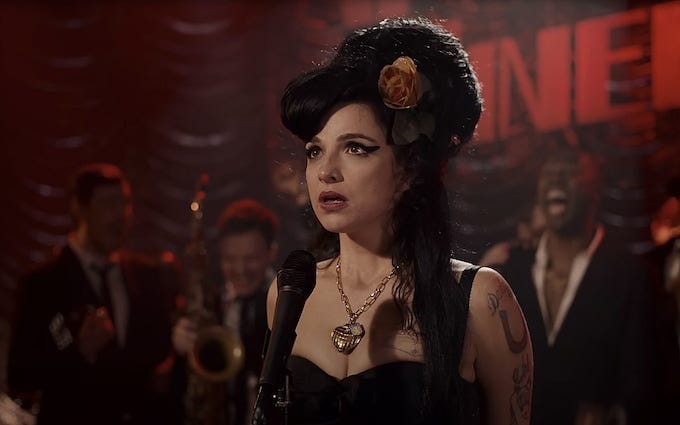Can You Imitate a Genius?
What the new Amy Winehouse film tells us about singing, talent, and AI
Catch-up service:
On London’s Empty Penguin Pool
Am I Anti-Woke?
Why It’s Good To Be Biased
In Praise of Slow Learners
Back To Black, the forthcoming Amy Winehouse biopic, is the product of some, shall we say, brave decisions. It is brave to have made a biopic of Winehouse at all, given she was taken from us only thirteen years ago, and given that her horribly truncated life offers little in the way of rich narrative material (Amy and Blake - I mean, not exactly Taylor and Burton, is it?). It’s brave to cast Marisa Abela, product of one of England’s most exclusive private schools, to play a girl from Southgate (I smell mockney). Bravest of all is the decision to have Abela impersonate Amy Winehouse’s singing.
The Sunday Times ran a piece on the movie last weekend, in which much was made of Abela’s exercise regime. This involved moving to Camden, for reasons unspecified, and “ten hours a day with a personal trainer” - um, OK. Then we get to the trivial matter of singing like Amy Winehouse:
For the singing, meanwhile, the initial plan was to use original Winehouse vocals, but Abela trained to the extent that the vocals in the film belong to the actress. She took guitar and vocal lessons, working with vocal coach Anne-Marie Speed four times a week, two hours at a time, for three months before cameras rolled…It paid off.
Did it though? A TikTok trailer for the movie, which includes a few clips of Abela singing, has just been released, to be greeted with fierce derision on social media.
Of course, fans are often hostile to popular representations of their idols, and social media thrives on scorn. But still, I think these critics may have a point. It’s not that Abela can’t sing - she clearly can and very well. It’s not even that she doesn’t sound like Winehouse. In fact, the problem is that she does sound like Winehouse, without sounding exactly like her, which is actually worse than not sounding like her at all.
It’s a problem akin to the one identified by the Japanese roboticist Masahiro Mori, in his 1970 essay on how humans relate to robots.
After the jump - the rest of this piece, plus a rattle bag which includes:
- Was McCartney really inspired to write Blackbird by the Little Rock Nine? An answer!
- The most successful crime crackdown in history
- How to de-risk your life
- A brilliant new podcast
- If you haven’t yet taken out a paid subscription, now’s the time. Listen to Jordan:






